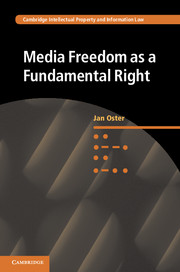Book contents
- Frontmatter
- Contents
- Preface and acknowledgements
- Table of cases
- Treaties, Conventions, Declarations and Statutes
- Reports and other documentary sources
- Introduction: aim, scope and method
- Part I The theoretical foundations of media freedom
- Part II General rules on media freedom
- Part III Specific limitations to media freedom
- Conclusion: tenets of a Media Freedom Principle
- Bibliography
- Index
- Cambridge Intellectual Property and Information Law
Introduction: aim, scope and method
Published online by Cambridge University Press: 05 June 2015
- Frontmatter
- Contents
- Preface and acknowledgements
- Table of cases
- Treaties, Conventions, Declarations and Statutes
- Reports and other documentary sources
- Introduction: aim, scope and method
- Part I The theoretical foundations of media freedom
- Part II General rules on media freedom
- Part III Specific limitations to media freedom
- Conclusion: tenets of a Media Freedom Principle
- Bibliography
- Index
- Cambridge Intellectual Property and Information Law
Summary
Ever since Johannes Gutenberg invented mechanical movable type printing, the mass media has played an important role for human communication. Before the internet emerged as the first democratic mass medium, operators of mass communication infrastructures, such as newspapers, TV or radio broadcasting, had the unique ability to disseminate information and ideas to a mass audience without the recipients having to be present, and to issue such publications on a periodical basis. The professional media, by virtue of its possibilities of newsgathering, its manpower and its infrastructure, was better equipped than private individuals to disseminate publications to a mass audience. It was incumbent on the traditional media to impart information and ideas on matters of public concern, to investigate government action, expose fraud and corruption and to inform the public, thus playing an essential role as a ‘watchdog’ or ‘fourth estate’ in a democratic society. Therefore, the mass media had the capacity to inform the public and shape public opinion, together with the opportunities to abuse this power. Many domestic constitutions and courts applying international human rights conventions thus acknowledge a special role of the mass media in the framework of freedom of expression not only by granting special privileges, but also by imposing enhanced duties and responsibilities on journalists and media companies.
Today, media law faces three fundamental challenges. First, the phenomenon of technological and content-related media convergence complicates the traditional categorisation of media services into broadcasting and press. Second, due to the concentration of media ownership, fewer individuals and organisations control increasing shares of the mass media. Third, as the internet evolves, the ability to reach a mass audience is no longer the privilege of traditional media corporations, and, hence, not a clearly distinguishing element for the media – public divide anymore. Citizen-journalists and other actors in civil society, in light of economically plagued traditional journalism, increasingly play the role of watchdog, for instance by covering local matters or reporting from conflict areas which professional journalists have hardly any access to.
- Type
- Chapter
- Information
- Media Freedom as a Fundamental Right , pp. 1 - 10Publisher: Cambridge University PressPrint publication year: 2015



